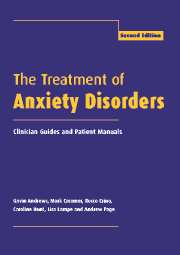Book contents
- Frontmatter
- Contents
- List of authors
- Preface to the second edition
- Abbreviations
- 1 Read me
- 2 General issues in anxiety disorders
- 3 General issues in treatment: Clinician Guide
- 4 Panic disorder and agoraphobia: Syndrome
- 5 Panic disorder and agoraphobia: Treatment
- 6 Panic disorder and agoraphobia: Clinician Guide
- 7 Panic disorder and agoraphobia: Patient Treatment Manual
- 8 Social phobia: Syndrome
- 9 Social phobia: Treatment
- 10 Social phobia: Clinician Guide
- 11 Social phobia: Patient Treatment Manual
- 12 Specific phobias: Syndrome
- 13 Specific phobias: Treatment
- 14 Specific phobias: Clinician Guide
- 15 Specific phobias: Patient Treatment Manual
- 16 Obsessive-compulsive disorder: Syndrome
- 17 Obsessive-compulsive disorder: Treatment
- 18 Obsessive-compulsive disorder: Clinician Guide
- 19 Obsessive-compulsive disorder: Patient Treatment Manual
- 20 Generalized anxiety disorder: Syndrome
- 21 Generalized anxiety disorder: Treatment
- 22 Generalized anxiety disorder: Clinician Guide
- 23 Generalized anxiety disorder: Patient Treatment Manual
- 24 Posttraumatic stress disorder: Syndrome
- 25 Posttraumatic stress disorder: Treatment
- 26 Posttraumatic stress disorder: Clinician Guide
- 27 Posttraumatic stress disorder: Patient Treatment Manual
- 28 Conclusions
- References
- Index
28 - Conclusions
Published online by Cambridge University Press: 05 August 2016
- Frontmatter
- Contents
- List of authors
- Preface to the second edition
- Abbreviations
- 1 Read me
- 2 General issues in anxiety disorders
- 3 General issues in treatment: Clinician Guide
- 4 Panic disorder and agoraphobia: Syndrome
- 5 Panic disorder and agoraphobia: Treatment
- 6 Panic disorder and agoraphobia: Clinician Guide
- 7 Panic disorder and agoraphobia: Patient Treatment Manual
- 8 Social phobia: Syndrome
- 9 Social phobia: Treatment
- 10 Social phobia: Clinician Guide
- 11 Social phobia: Patient Treatment Manual
- 12 Specific phobias: Syndrome
- 13 Specific phobias: Treatment
- 14 Specific phobias: Clinician Guide
- 15 Specific phobias: Patient Treatment Manual
- 16 Obsessive-compulsive disorder: Syndrome
- 17 Obsessive-compulsive disorder: Treatment
- 18 Obsessive-compulsive disorder: Clinician Guide
- 19 Obsessive-compulsive disorder: Patient Treatment Manual
- 20 Generalized anxiety disorder: Syndrome
- 21 Generalized anxiety disorder: Treatment
- 22 Generalized anxiety disorder: Clinician Guide
- 23 Generalized anxiety disorder: Patient Treatment Manual
- 24 Posttraumatic stress disorder: Syndrome
- 25 Posttraumatic stress disorder: Treatment
- 26 Posttraumatic stress disorder: Clinician Guide
- 27 Posttraumatic stress disorder: Patient Treatment Manual
- 28 Conclusions
- References
- Index
Summary
Part of this book has been quite conventional. The reviews of the syndromes and treatments in relation to panic and agoraphobia, social phobia, specific phobias, obsessive–compulsive disorder, generalized anxiety disorder and posttraumatic stress disorder are brief, succinct overviews designed for busy clinicians. The discussion of general issues in the etiology and treatment of the anxiety disorders is also essential information for the practicing clinician. The Clinician Guides and the Patient Treatment Manuals are, however, quite unusual. These Guides and Manuals need to be placed in context.
There is an art and a science to good medical practice. Because the science tends to predominate, the art of treatment is seldom discussed, either at a general or a specific level. Elsewhere, we have called attention to the need for the elements of good clinical care to be made explicit. Good clinical care needs to be taught to trainee psychiatrists and clinical psychologists for use with patients for whom there is no specific remedy immediately applicable to their disorder (Andrews, 1993a). This book is different. It is about treating persons with chronic anxiety disorders who, if expertly treated with specific remedies, can be expected to recover. This recovery has been made possible by the scientific advances that have occurred in our understanding of the treatment of the anxiety disorders. Much of this book is focused on the cognitive behavioral treatments simply because the instructions for prescribing medications are relatively simple and, courtesy of advertising by the pharmaceutical industry, do not need repeating in a book on the treatment of anxiety disorders. The cognitive behavioral treatments are less well known and, being both nonproprietary and not for profit, are neither as widely promoted nor as readily available as are the drug therapies.
There is a greater problem. The amount of evidence for the efficacy of psychotherapy is less plentiful than the evidence that is routinely provided by the pharmaceutical industry to the national regulatory authorities in each country. This evidence is provided as part of the process of having products cleared for marketing and, in many countries, for subsidy. In the first edition of this book, much of the evidence about the efficacy of cognitive behavioral therapy came from trials in which the progress of treated groups were compared to their own pretreated status, or else were compared to the progress of wait-list or no treatment control groups.
- Type
- Chapter
- Information
- The Treatment of Anxiety DisordersClinician Guides and Patient Manuals, pp. 550 - 554Publisher: Cambridge University PressPrint publication year: 2002



